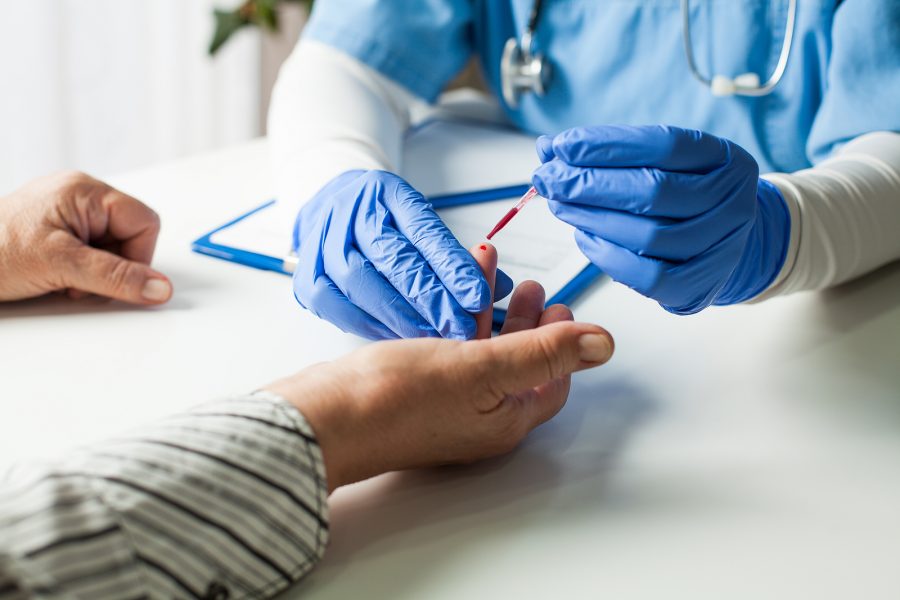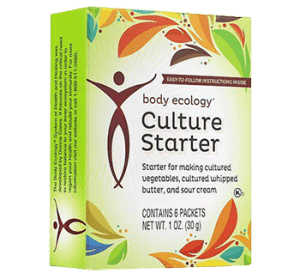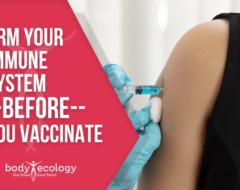
What science is saying about blood type and COVID-19
Recent research is suggesting that your blood type may affect your risk of getting COVID-19 and could influence the severity of the disease. While this doesn’t mean a free pass for anyone with a less susceptible blood type, it might help begin to solve some mysteries over why the coronavirus has more devastating effects on some individuals but not others.
Each jar of cultured veggies you make is brimming with immune-boosting potential. Use our Culture Starter to keep home fermenting simple and safe.
Free download: Get the Body Ecology blood type ebook.
How blood type may impact COVID risk, according to science
Researchers have been talking about blood type and COVID-19 susceptibility for months.
But recently, the genetics company 23andMe revealed preliminary data from their own study showing that a person’s blood type, which is determined by the ABO gene, appears to affect susceptibility to coronavirus.
The company commissioned a huge study, even recruiting people outside of their already massive 23andMe genetics database.
Specifically, they sought out folks in the U.S. diagnosed and hospitalized with COVID-19. All in all, more than 1 million people were involved. Using this data, 23andMe launched their COVID-19 Severity Calculator last year.
The key finding?1
- People with the O blood type (whether O positive or O negative) had a lower incidence of COVID-19 positive tests.
- The reduction in risk appeared to be about 9 to 18 percent for people with an O blood type compared with other blood types, among which there was little difference in susceptibility.
- This difference in risk of testing positive for COVID-19 seemed to hold even when researchers took into account age, sex, body mass index, ethnicity, and co-morbidities (i.e., pre-existing conditions like heart disease and diabetes).
After adjusting for confounding factors, such as age, sex, race, ethnicity, BMI, and high-risk co-morbidity or being immunocompromised, those with blood type O were, on average, 14-percent less likely to acquire a COVID-19 infection and 19-percent less likely to be hospitalized for the infection.
In populations at high-risk for exposure, such as healthcare workers, essential workers, and people exposed to a known case of the disease, the O blood type had an even greater protective effect, reducing the risk of acquiring the virus by 19 percent.
This isn’t the first time blood type and COVID-19 have been linked
Earlier studies have also found that blood type is correlated with the risk of testing positive for SARS-CoV2.
In a study published back in March 2020, researchers in China found that “blood group A was associated with a higher risk for acquiring COVID-19 compared with non-A blood groups, whereas blood group O was associated with a lower risk for the infection compared with non-O blood groups.”2 This may be what prompted a slew of similar studies in other countries as COVID-19 spread.
In another study that first appeared in April 2020 and then as a peer-reviewed paper in November 2020:3
- Researchers looked at health data from more than 14,000 patients with COVID-19 and found a slightly increased infection prevalence among non-O types.
- In addition, the risk of needing intubation was decreased among A and increased among AB and B types, compared with type O.
- The risk of death was increased for type AB and decreased for types A and B. There was also a moderately increased risk of infection in people with Rh-positive blood type.
Another recently published study, this time co-authored by Canadian Blood Services’ chief scientist, Dr. Dana Devine, revealed that people with blood groups A or AB were more likely to have a severe case of COVID-19 compared to those with O or B type blood.4
The data came from critically ill patients at two Vancouver hospitals, where 84 percent of those with blood type A or AB needed intubation and ventilation compared to just 61 percent of those with O or B type blood.
Those with A or AB type blood also tended to stay longer in the hospital’s intensive care units (ICU). For blood types O and B, the average stay was nine days. For A and AB groups, the stay was 13.5 days.
So, it seems that not only does your blood type affect your risk of getting COVID-19, it may also affect your chances of needing serious medical intervention and of survival. Why? The answer remains elusive but may be connected to how the virus attaches itself to your cells and how your genes influence the number and type of receptors on those cells, as well as to your overall risk of cardiovascular problems.
There’s never been a better time to strengthen your body’s natural defense against a virus.
What does the ABO gene have to do with COVID-19?
The latest data on blood type is still preliminary. But we’ve known for a while that the coronavirus responsible for COVID-19 gets into cells by attaching to angiotensin-converting enzyme (ACE) 2 receptors and that the disease can affect blood clotting, causing cardiovascular and cardiopulmonary problems.
Indeed, coagulopathy (problems with bleeding disorders) is common in COVID-19, with dangerous blood clots being a hallmark of the disease.
Interestingly, this may help tie together blood type and COVID-19 risk because the ABO gene that determines your blood type also influences:
- Activity of ACE
- Red blood cell count
- Hemoglobin levels
- Hematocrit
- Von Willebrand factor
- Myocardial infarction (heart attack)
- Coronary artery disease
- Ischemic stroke
- Type 2 diabetes
- Venous thromboembolism
A 2012 meta-analysis found that having a non-O blood type was among the most important genetic risk factors for venous thromboembolism.5
Of course, it’s not just as simple as saying that anyone with an O blood type has a lower risk of dying of COVID-19. Instead, it seems that a specific variant in the ABO gene is associated with lower risk.
This single nucleotide polymorphism (SNP) is a T at the rs505922 location on the gene. This variant is associated with a 12-percent reduced odds ratio of testing positive for COVID-19.1
If you download your genome as raw data from 23andMe and run it through software, such as Promethease, you can find out whether you have the wild type or a variant of rs505922.
Whether you know your blood type or not, it’s still necessary for your sake and the sake of those around you to follow public health precautions, such as handwashing, mask-wearing, physical distancing, and staying home to stay safe.
Donna’s note: Personally, I think these cautions are incomplete. The media is not telling us to strengthen our immune systems or provide us with information on how to do this. This is why learning from Body Ecology, from doctors, and from other practitioners in our space is important. We will all continue to inform you, the public, that there’s more to do than washing your hands and wearing a mask.
For those who choose to become vaccinated (around 25 percent of the U.S. population has not), having a strong, robust immune system when you go in for the vaccine is a must!6
Deep, healing sleep, reducing stress, walking or other forms of gentle exercise, plus pampering yourself, are important for helping to create a robust immune system. Sleep expert Dr. Michael Breus strongly advises that getting a good night’s sleep is essential before you go in for the vaccine in order to build a healthy antibody response.7
Diet is also key, and — as you are probably well aware of by now if you’ve been following me — a healthy microbiome is a must. Remember that 70 percent of your immune system is determined by the microbiome in your gut.8 At Body Ecology, we promote the use of certain (but not all) fermented foods to not only nourish you but to nourish your gut and immune system as well.
And as for your blood type: If you know you have type A or AB blood, this latest research isn’t cause for terror, just as having type O blood doesn’t mean you can skip the hand sanitizer and other safety measures.
Instead, being armed with greater knowledge about your blood type could provide extra incentive to be cautious and build your immune system. It may also offer a little more peace of mind if you’re exposed or do get infected.
Free download: Get the Body Ecology blood type ebook.
REFERENCES:
- 1. “23andMe finds evidence that blood type plays a role in COVID-19.” 23andMe Research, 2020.
- 2. Zhao, Jiao. Relationship between the ABO Blood Group and the COVID-19 Susceptibility. medRxiv 2020.03.11.20031096; doi: https://doi.org/10.1101/2020.03.11.20031096.
- 3. Zietz, M., Zucker, J. & Tatonetti, N.P. Associations between blood type and COVID-19 infection, intubation, and death. Nat Commun 11, 5761 (2020). https://doi.org/10.1038/s41467-020-19623-x.
- 4. Hoiland RL, Fergusson NA, Mitra AR, Griesdale DEG, Devine DV, Stukas S, Cooper J, Thiara S, Foster D, Chen LYC, Lee AYY, Conway EM, Wellington CL, Sekhon MS. The association of ABO blood group with indices of disease severity and multiorgan dysfunction in COVID-19. Blood Adv. 2020 Oct 27;4(20):4981-4989. doi: 10.1182/bloodadvances.2020002623. PMID: 33057633; PMCID: PMC7594392.
- 5. Dentali F, Sironi AP, Ageno W, Turato S, Bonfanti C, Frattini F, Crestani S, Franchini M. Non-O blood type is the commonest genetic risk factor for VTE: results from a meta-analysis of the literature. Semin Thromb Hemost. 2012 Jul;38(5):535-48. doi: 10.1055/s-0032-1315758. Epub 2012 Jun 27. PMID: 22740183.
- 6. “COVID-19 Vaccinations in the United States.” COVID Data Tracker. Centers for Disease Control and Prevention, 2022.
- 7. Breus, Michael, MD. “Quality Sleep, Your Immune System, and the Coronavirus Outbreak.” Feb. 2020.
- 8. Vighi G, Marcucci F, Sensi L, Di Cara G, Frati F. Allergy and the gastrointestinal system. Clin Exp Immunol. 2008;153 Suppl 1(Suppl 1):3-6. doi:10.1111/j.1365-2249.2008.03713.x.










